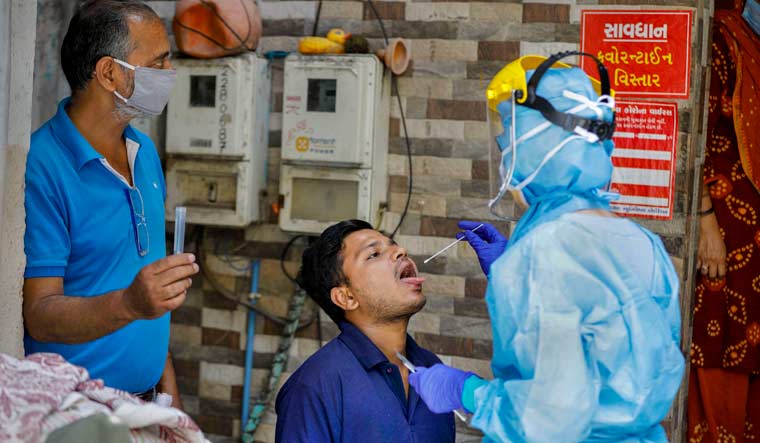On Wednesday, the Supreme Court asked the Centre to ensure free testing for COVID-19 in government and private laboratories. While the government has already been testing for COVID-19 for free, private laboratories had been allowed to charge Rs 4,500, after the central government capped the price of the test on March 17.
The interim order of the apex court—the SC has also asked the Centre to work on a mechanism for reimbursing the private laboratories—has not gone down well with private laboratories. Dr A. Velumani, founder-chairman and managing director of Thyrocare laboratories, said that the order was a “setback” and the company had been compelled to stop testing after the order came in. Thyrocare was running 200 tests a day until the SC order came in.
“Ideally, costs for all employed people should be covered by the employers. Costs for all the unemployed should be covered by the government. The government is doing it under the Ayushman Bharat scheme,” Velumani said. What the order has led to, he said, is confusion.
“We are getting messages from those who got the test done some nine days ago, asking for reimbursement now. Others are asking us to charge but do the test,” he said. “At my company, we are charging Rs 3,500 for the test [until March 31, 2021] , and that is zero profit already,” he said.
A spokesperson of Max Healthcare said that based on the latest order of the Supreme Court, the laboratory at Max Hospital in Saket had stopped charging for the COVID-19 test. "We are awaiting further directive from the government," he said.
As of now, 139 government laboratories have been activated by ICMR, and 67 private laboratories have been approved to test for COVID-19. Testing at private laboratories constitutes a small percentage of the total tests in India—on Tuesday, for instance, out of the 13,345 samples tested in India, private labs accounted for 2,267 samples.
Private laboratories feel that the "free testing" can only work if the government reimburses the costs, and on time. In a statement, the association of private healthcare providers, however, said the SC order was a “welcome sign” as they have been stressing for the need for more testing that can quickly reveal the likely spread of COVID-19 infection.
"Hon’ble Court has asked that government reimburse the charges to the private labs. The labs are more than happy to be part of government initiative to mitigate the COVID menace but have concerns on getting reimbursement in time as has been the past experience from government schemes like CGHS, ECHS and ESI," the statement said.
"Unlike hospitals, laboratories are small entities and cannot sustain credit for a longer time. It is suggested that government may establish a testing portal where once the lab uploads the final report, the reimbursement should automatically be transferred. This can easily be achieved with present technology," the group said. "A large number of tests can be beneficial as it can provide the trend to the government for overall as well as for the regions. To cite an example, during the testing done between 6-8th April, the percentage of positive cases has been found to be from 2.31- 2.78%, whereas it was in the range of 3-8.75% during the period from 29th March to 5th April," the statement said.
The All India Drug Action Network (AIDAN) said that any reimbursement of costs of the private lab must be "rational and evidence based".
"AIDAN, along with other health groups, had written to the government to make testing as well as treatment for COVID-19 free. We are pleased with the Supreme Court’s direction that the Government must make COVID-19 testing free of cost, regardless of whether the testing takes place through government or private labs. The cap on private lab charges of Rs 4500 had in fact enabled price inflation of test kits and allowed for excessive profits to private labs, which were heavily advertising their services," said Malini Aisola, co-convenor, AIDAN.
"In order to facilitate the low cost procurement of test kits, the government should do a cost estimation exercise and cap the price of test kits. This would help the government in ramping up testing and ensure that approved private laboratories continue to offer COVID-19 tests at full capacity,” Aisola said.
A doctor in a medical college in a district of West Bengal said that the government should provide the test kits and reimburse costs to private laboratories to widen testing.
"If the government is really serious about enhancing access to testing, then it also has to ensure that a patient friendly atmosphere exists, and those who come for testing don't have to travel one place to the other [from the doctor who directs them to a fever clinic, where the assessment is made whether the patient needs to be tested]. Besides, people will only come forward if they can access a trusted service provider, and wouldn’t just be locked up in a facility. If they fear the service provider, then they will prefer to stay home and spread the infection," said the doctor who did not wish to be identified.
Chhattisgarh-based Sulakshana Nandi of Jan Swasthya Abhiyan said that the two private laboratories approved by ICMR in the state had not started testing for COVID-19 yet. Nandi said that most in the "for-profit" private healthcare sector had not really stepped up during the crisis.
"They continue to see everything from a profit-making point of view. They have always resisted any regulation and even now, most state governments are unable to bring them under their control—not just in terms of taking over, but also ensuring adherence to protocols,"said Nandi.
The WEEK reached out to Dr Lal Path Labs and SRL diagnostics with queries, but had not received a response until the time of publishing.



